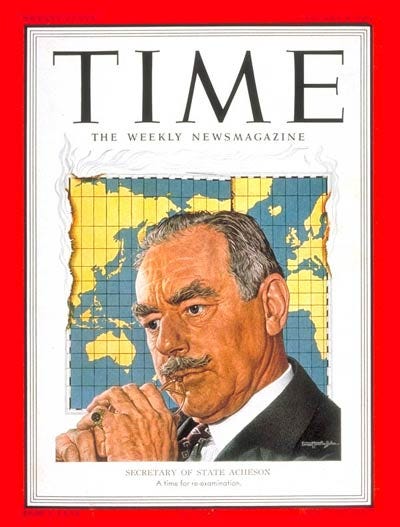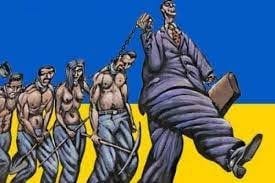Will Ukraine receive a post-war Marshall Plan?
If you like what you read, consider donating to my patreon.
A Ukrainian post-war marshall plan is a very popular topic among Ukrainian journalists, politicians, and even leftwing activists in Ukraine and Poland. The idea is that the US and the EU will sponsor Ukraine’s rapid industrialization in the interests of creating a strong buffer state against Russia. This was supposedly the logic behind US sponsorship of west European economic development after WW2, with the eastern opponent being the USSR.
The problem is that this historical analogy is wrong. The military threat of the USSR wasn’t the cause of the Marshall plan, but its justification. I recommend Fred Block’s book the Origins of International Economic Disorder, chapter 4, and Michael Hudson’s Superimperialism for more on the motivations of the Marshall plan.

The real reason for the Marshall plan was the need for the US to create a market for its huge export surplus. This huge surplus had been built up during the WW2 statist war economy, and after the war these millions of manufacturing jobs and factories should have gone unemployed in the return to a normal capitalist economy. This would have returned the US economy to the state of mass unemployment and economic depression of the 1930s. There was no way to consume all this manufacturing capacity domestically, so there had to be found a foreign outlet for it. The Marshall plan fulfilled this need in several ways:
· By increasing European purchasing power, they became capable of buying US exports.
· By creating the menace of the USSR invading Europe and ultimately the US, the conservative US public could be convinced to allow the government to spend ‘our taxpayers’ money in Europe.
· This military threat created a market in Europe (which was ‘gifted’ purchasing power through the Marshall plan) for the huge US military-industrial complex and the millions of jobs and incomes it guaranteed.
· By isolating the USSR, the US destroyed the only real competitor over the European market. During WW2 and directly after, there were plenty of discussions between US state figures such as Harry Dexter White, Soviet and European leaders about increasing mutual trade and investment. But losing its control over the European market would have doomed the US export surplus and created domestic unemployment and decreasing wages, returning the US to its pre-WW2 economic depression, so this idea was scrapped when the Truman government came into power.
Sharing Western Europe, the US would have lost control over the west European ‘bridgehead to Eurasia’, And according to the US geopolitical strategist Brzezinsky, control over this region is the key to global domination (The Grand Chessboard - American Primacy and its Geostrategic Imperatives).
As we can see, the motivations behind the Marshall plan are totally different to those behind US and EU engagement in Ukraine.
US interests in Ukraine are mainly military or geopolitical, not economic. Ukraine is a very poor country with little purchasing power – 85% of the population earned around $300 USD or less in 2020, and its exports and domestic industry has hardly been booming in recent decades. The US already has markets for its produce, and in any case, its global power is today much more financial rather than industrial, as it was in in the middle of the 20th century. To secure this financial power, it is more important to discipline through various means (military, paramilitary, financial sanctions, fostering domestic political movements) the industrial powers (Germany, China, Japan, Russia) that might be interested in challenging US domination.
Though it is outside of the bounds of this article to analyze this in more detail, this is why the US has been so interested in Ukraine – according to Brzezinsky, Ukraine is the most important ‘geopolitical pivot’ country on earth (the Grand Chessboard, p121). For him, control over Ukraine means control over Eurasia, which means control of the earth.
For Russia – gas transportation to Europe, control over global food production (which is what control over both Ukrainian and Russian agriculture is equal to), access to the Black and Azov sea ports. For China – a crucial stop in the overland belt and road project, uniting Asian production with west European consumers and technology, thereby bypassing sea-based dependence on US consumers, trade and financial networks. If China could easily transport its goods over Eurasia, it would no longer need to worry about the threat the US poses to its trade in the ‘Indo-pacific’ region (such as the Straits of Malacca). For Germany – a Ukraine that is not hostile to Russia (ie the pre-2014 Ukraine) is one that does not challenge the flow of cheap Russian energy to Germany, allowing the latter’s industrial exports to compete even with that of productive low-wage nations like China. In all these scenarios, ‘real economy’ nations would acquire sufficient economic strength to possess geopolitical subjectivity, ultimately leading them to set up their own currency and financial zones.

The US needs Ukraine as a military weapon against Russia and to continue US control over – or simply weakening of - Eurasia. This doesn’t require industrializing Ukraine - the US can simply supply Ukraine with weapons. And anyway, US companies like Raytheon or Lockheed Martin need to eat too, right? If Ukraine was itself a highly industrialized country that could easily defeat any Russian military offensives, this would greatly shorten the duration of the conflict, when what is desired is a protracted conflict to exhaust the Russian economy and create domestic political crises there. And needless to say, it also increases the amount of demand for the US military-industrial complex.
Hence the constant statements by US leaders about how this conflict will take a very long time. Hence Boris Johnson urgently visits Kyiv with military aid when it seemed like negotiations between Ukraine and Russia are getting productive, with the Ukrainian government announcing shortly after that negotiations with Russia can wait until after Ukraine’s military victory. Hence Biden insists on calling Russia’s acts in Ukraine a ‘genocide’ (despite French or German disagreement) - you can’t negotiate with a modern Hitler.
Really, I don’t have any clue why people are talking about ‘the Ukrainian post-war Marshall plan’, when during the war Western creditors are continuing to take out more money from the Ukrainian real economy than they give as military aid. I will end with this recent Facebook post by Ukrainian business leader Anatoliy Amelin, which was very realistic in its estimation of the likelihood of the postwar Ukrainian Marshall plan:
Don't build illusions about the Marshall Plan!
There will be no charity. Everything will be as pragmatic and cynical as possible, as much as "European values" are.
All such projects have always been built on the principle of relations between the Metropolis and the Colony (!)
1. "He who pays, dances" remember?
He will also be the one who will allocate money for the reconstruction of Ukraine and determine the priority, and will appoint executors.
As you know, the main recipients of orders and contracts will not be Ukrainian companies
2. The metropolis does not need a rich independent colony.
The metropolis is interested in its economy and the demands of its enterprises.
3. But the Metropolis does not need an unpredictable colony.
Therefore, the maximum bet will be on the stabilization of the economy, budget, social guarantees and the absence of independent colony policy!
4. The metropolis considers the Colony as a "colony" in all senses.
The colony has no right to produce products with high added value. This is the prerogative of the Metropolis.
The colony is:
- buyer of Metropolis products
- supplier of raw materials
- supplier of labor resources
5. The ideal Colony - one that does not take money from the Metropolis and reaches self-sufficiency.
And she can protect herself ;)
If you think that the arrested Russian reserves will go to Ukraine ... then answer these questions:
- Who arrested this money?
- How legal is it and is there a risk of litigation?
- How long will the trial take in European courts?
- Who will make the decision about the use of these funds?
Therefore, remember the main principle:
"Saving the drowning man is the work of the drowning man himself!"
Namely:
1. We can and do count only on ourselves.
2. To avoid disappointment - don’t get your hopes up
3. If someone helps - will be a good bonus.
4. Develop your anti-crisis plan for the economy based on its resources and capabilities.
5. Well, and implement it ourselves, building a mutually beneficial PARTNERSHIP with Western countries, taking responsibility
6. It is this approach (responsibility) that will allow us to accumulate the resources necessary to restore and build a mutually beneficial partnership with other countries without becoming their colony.
This is in a nutshell. And if we do not want to continue to be a colony, which we have been for the last 104 years (first of the USSR, then of Russia, and today, judging by the structure of our raw material exports - of all developed countries)
But first you have to win!
Read, draw conclusions, spread!




